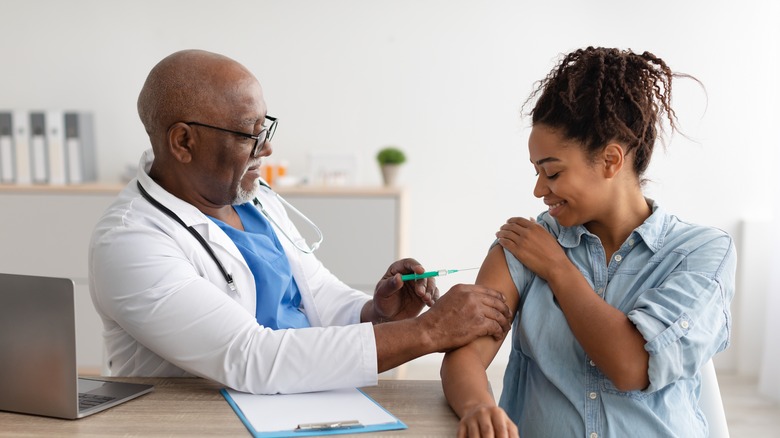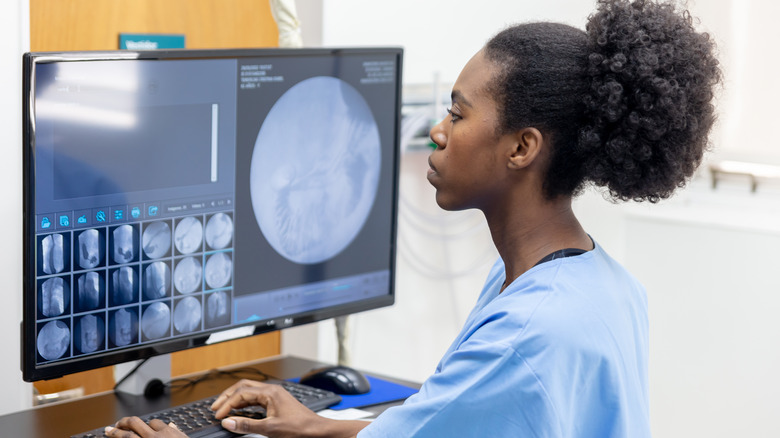5 Must-Know Things Before Joining A Clinical Trial
If you've ever received a vaccine or medication, you can thank people who have participated in a clinical trial. Before any drug reaches the market for general use, it must undergo clinical trials to ensure its safety and effectiveness. Clinical trials also test surgical procedures or other medical interventions on people with specific conditions or diseases.
Clinical trials need healthy volunteers to help advance the field of medicine. According to Johns Hopkins Medicine, healthy people who participate in clinical studies want to help others have a healthier future. Whether you are healthy or not, participating in a clinical trial might offer additional health care. Joining a clinical trial might also give you access to new treatments that weren't previously available.
Clinical trials need volunteers because 37% of these studies don't have enough volunteers to even get their cutting-edge research off the ground (via Alliance for Aging Research). You can search the more than 400,000 clinical trials at ClinicalTrials.gov to take part in a study. However, there are a few things you should know.
Know the type of study
The type of study can say a lot about how much time and effort will be involved on your part. The larger cohort studies will often involve a lot of people for months or years, but they are typically observational, meaning you'll answer several questionnaires periodically about your health, diet, exercise behaviors, or other measures to see how all these factor into people's overall health over time (via Harvard Medical School). Clinical trials will have you take medication, partake in a particular procedure, or receive another type of intervention to improve or prevent a health condition.
You'll also want to know if you're eligible for a particular study. Some trials are testing therapies for a particular condition, so you wouldn't be eligible if you didn't have the condition. Other clinical trials look for healthy participants with no previous health conditions. While clinical trials aim for diversity and inclusion, some will have eligibility requirements based on age or sex (via Food & Drug Administration).
Phase of the clinical trial
If the clinical trial is testing a particular drug, it's important to know the phase of the clinical trial (via Washington Post). While drugs are often tested and developed in labs, researchers must apply for eligibility for a clinical trial before they're tested on humans (via Food & Drug Administration). Mind you, the drug is often tested on cells in the lab or on laboratory animals before it's ready to undergo human trials. A Phase 1 clinical trial is the first time the drug is tested on humans. These studies are typically small and mostly look at whether or not the drug has side effects.
Phase 2 clinical trials will involve dozens or hundreds of participants to test both the safety and effectiveness of the drug. A Phase 3 trial is the largest of clinical trials, and usually recruits hundreds or thousands of people. Phase 3 trials will often test the drug against a placebo, and the volunteers in the study typically aren't aware if they're taking the placebo or the experimental drug. A quality Phase 3 clinical trial will randomly assign volunteers to receive either the placebo or the drug, and sometimes the people who give you the drug (or placebo) aren't aware of which you'll receive.
Procedure and safety
Depending on the type of study, it's also important to know what kinds of procedures will be involved so you know how much time it will take out of your routine. In other words, you could be going to a clinic once a week for medical checkups, so you'd have to consider how you'll negotiate time off work or arrange childcare. Sometimes clinical trials will have you keep a daily diary to track any symptoms or your lifestyle, which could become time-consuming if the study will be tracking you for months or years.
You'll also want to be aware of what protocols have been put into place to ensure your safety during the study. According to the National Cancer Institute, an institutional review board (IRB) will typically review the safety measures before it approves the study, and your consent form will outline the study's procedure and safety measures. Your safety will also be monitored during the course of the study by the IRB, the research team, and Data and Safety Monitoring Boards (if it's a phase 3 clinical trial).
Risks and benefits
Your consent form might review the risks and benefits of participating in the clinical trial. According to the National Library of Medicine, some clinical trials might include certain risks, such as incurring harm or complications during the study. These risks could include side effects from a particular drug or the study taking more time than expected. People who have a certain condition might not receive the experimental treatment if they're in the placebo group, or the treatment might not work for their experimental treatment.
On the other hand, people who have a certain condition could benefit from volunteering in a clinical trial because they could receive treatment for their condition before it's available to others, according to the National Institutes of Health. You could also get access to quality healthcare, including specific medical attention for a condition (if you have one pertaining to the trial). A healthy volunteer for a clinical trial can benefit by helping research teams understand treatments and procedures that might improve the health of others.
Who will cover expenses?
Lastly, it's important to know who will cover the costs related to your participation. According to the National Cancer Institute, most insurance companies should cover patient care costs for routine treatments such as doctor visits, lab tests, or X-rays. The study's sponsor, such as a drug company, a foundation, or the government, would cover research-related costs for your participation, such as the experimental drug, any lab-related tests, or imaging tests for the clinical trial. Outside organizations might cover expenses such as parking, gas, or copayments for visits to your doctor (via Washington Post). Because of your participation in a clinical trial, you should get a standard of care that could be better than your usual care.
You might also wonder if you get paid for a clinical trial. According to the Washington Post, participation is usually voluntary in a clinical trial if you have a particular condition. Although healthy participants are sometimes paid, strict clinical trials typically aren't. Paid clinical trials often involve considerable risk, according to Antidote. Because phase 1 trials might pose more risk, they might be paid more than other types of trials.






